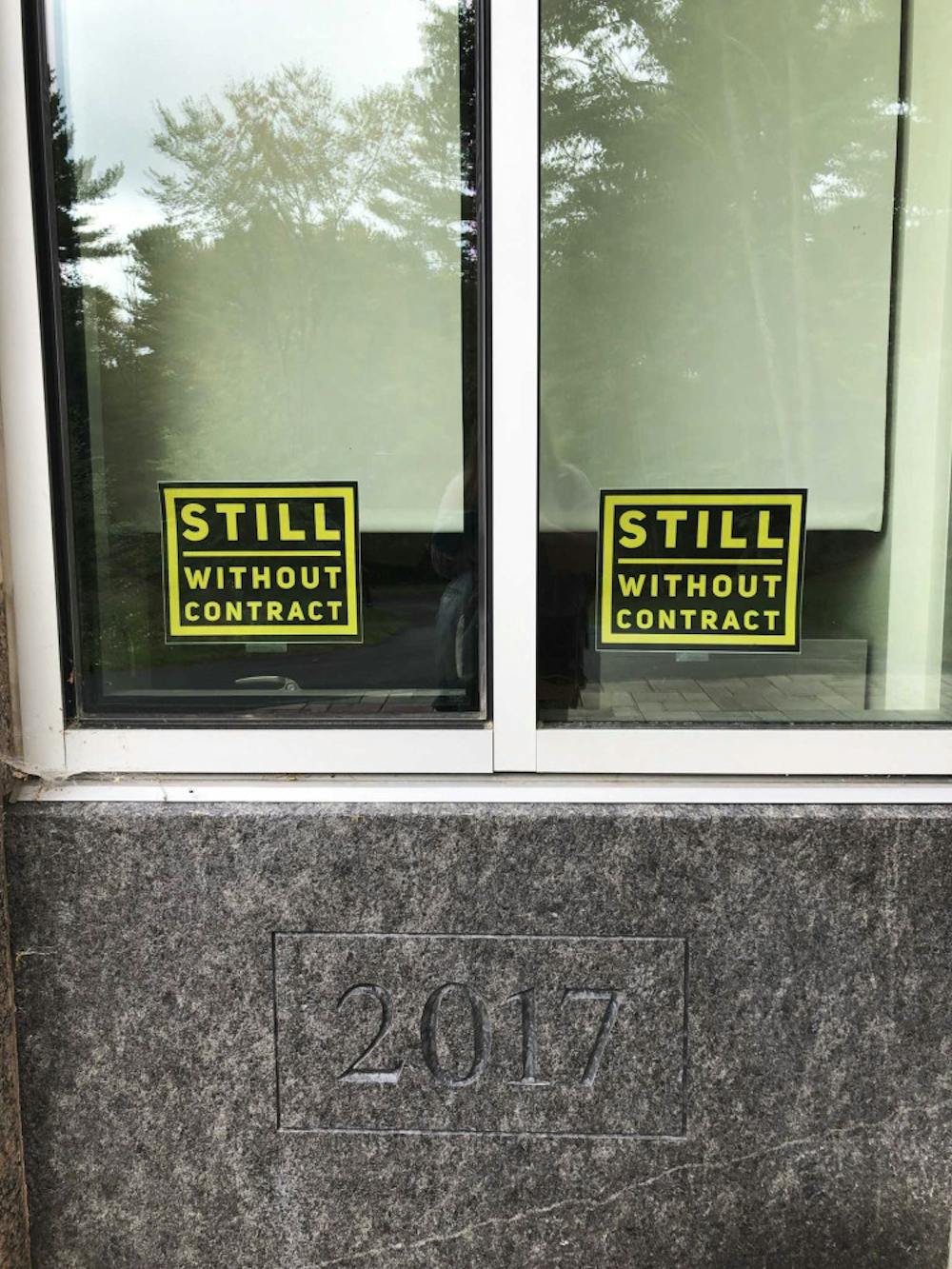On the ground floor of Hamilton Smith Hall, a tiny black sticker with yellow lettering that reads “still without contracts” can be seen on the bottom left corner of Lawrence Beemer’s office window, along with many other office doors that line the hall.
Beemer, an English lecturer, is one of 193 lecturers the University of New Hampshire (UNH) employs; together, they have been without negotiations for new contracts since June 30, 2017, or, 830 days as of publication.
The lecturers teach around 51 percent of the credit hours that the university offers and in 2014, they established UNH Lecturers United-AAUP (UNHLU-AAUP) due to poor working conditions and a wide-spread low salary, which at first, through the union, led to many gains in their contracts, according to senior English lecturer Molly Campbell, UNHLU-AAUP’s spokesperson.
“Fortunately, contracts are negotiated on a regular schedule with the university,” Campbell said. “Our contract expired on June 30, 2017, and we have been trying to settle a contract ever since. This means that we still have that first contract [from 2014] with no changes or improvements. It also freezes salaries, so no lecturers have received any cost of living raises since the contract expired.”
According to Campbell, the main goal for the contract negotiations are to improve job security and keep their salaries up-to-date with the cost of living, which according to Zillow.com, the average home index in Durham, NH is $377,600, rising 3.2 percent in the past year, on par with the 1 to 3 percent increase in salary that the union is looking for.
“Currently, lecturers’ pay is higher than the national average for the rank at public intuitions and approximately 8 percent higher than the mean of the comparator schools the union and the university agreed to look for benchmarking purposes,” UNH Spokesperson Erika Mantz said, adding that it’s important to remember that the lecturers are not without a contract, just without a new, updated contract from the one that ended in June 2017.
Job security is one of UNHLU-AAUP’s main tasks because in the past, according to Campbell, 17 lecturers were non-renewed for the 2018-2019 school year, leaving them no time, or a heads-up to look for a new job for the upcoming academic year.
But for 2019-2020, 17 new lecturers were hired across all of UNH’s academic colleges. One of the lowest salaries for a lecturer is in the $47,000 range, with the highest salary being in the $100,000 range, according to the public salary document released by the University System of New Hampshire (USNH).
“Lecturers generally have a heavier course load, while tenure-track faculty teach fewer classes, but have research as a part of their defined role at UNH,” Campbell said. “Lecturers are evaluated on their teaching and many have training, degrees or certifications that specialize in teaching. Lecturers do not have tenure and they work on contracts that must be renewed at varying intervals.”
But recent strides in the past week have been made for the push of negotiating the contract by President Dean, who is not involved in the process, but is interested in helping the efforts and met with the UNHLU-AAUP on Monday to discuss the issue.
“Our negotiating teams have met several times and are continuing to make progress,” Dean told The New Hampshire earlier this week. “I am confident that the efforts of our negotiating teams will lead to a mutually acceptable agreement.”
Of Monday’s meeting with President Dean, Campbell said that Dean “sees lecturers as central to the mission of the university,” adding that she is “hopeful that he can convey this to his team and that we can settle a fair contract soon.”
Though some students may not be aware that their lectures have experienced salary freezes in the past year, Campbell reminds students that even without a new, negotiated contract, “students remain the central focus of our careers.”














